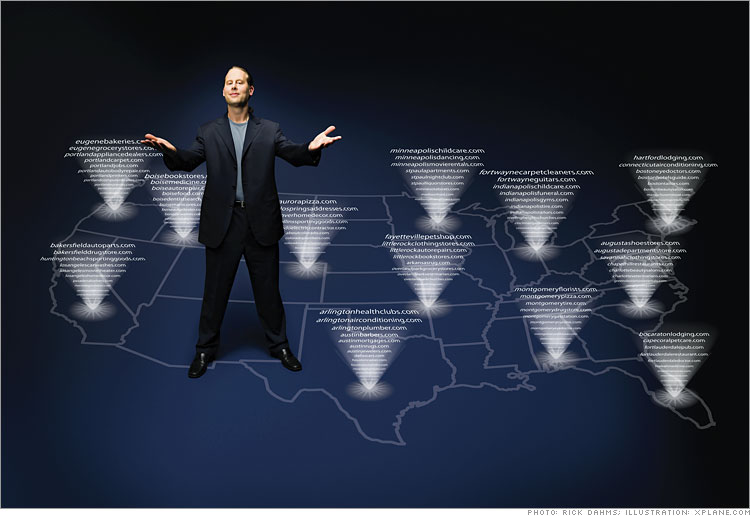The Web's local mogulMarchex CEO Russell Horowitz is launching websites for thousands of cities, big and small. The play? To beat Microsoft, Google, and Yahoo to the punch in connecting businesses to nearby customers.(Business 2.0 Magazine) -- The two Web multimillionaires had never crossed paths, but when Russell C. Horowitz and Frank Schilling finally met to talk business three years ago, the summit began in style - sipping soft drinks poolside at the Four Seasons Las Vegas and chatting about private jets. Horowitz, a ponytailed 38-year-old at the time, had made his fortune as the founder of a bubble-era darling called Go2Net, which he sold for $1.6 billion. Schilling, whose regular attire is designer surfwear, made his mint in secrecy as a domain-name investor working out of an ocean-front condo in the Caymans. Horowitz owned a share of a Citation X, the fastest personal aircraft in the sky. Schilling, who pulls in $20 million a year from his domain business, coveted one for himself. "At the time," he says, "I was planeless." 
Marchex CEO Russell Horowitz
 Marchex CEO Russell Horowitz
But the meeting was about more than just a couple of moguls and their boy toys. Horowitz had invited Schilling to Vegas because he needed a bridge to the world of domainers, as domain investors call themselves. It was a below-the-radar profession, full of cagey characters, tainted by incidences of cybersquatting. And Horowitz wanted in. He had recently launched a company called Marchex (Charts) with some pals from Go2Net, and they had an ambitious plan: to create a new type of online media company, with a network of thousands of websites localized for virtually every city and town in the United States. To get there, they needed domains, and lots of them - tens of thousands of names that coupled the name of a city with a logical market term, from BoiseRetail.com to AtlantaManicures.com. And Schilling knew all the players. "So who are the big guys?" Horowitz asked Schilling at one point. "Who do you think will sell?" Throughout the day, Schilling gave Horowitz and his partners the rundown of the secretive domain business. And just six months later, Schilling's help as a power broker led to Marchex's making the biggest purchase ever of a domain portfolio: The company paid about $160 million for more than 100,000 names, jump-starting Horowitz's efforts to build a sprawling new media company. This came on top of 100,000 domain names Horowitz and his team had already registered. They have since snapped up several tech and online ad firms, and this spring they relaunched an astonishing 100,000 websites, transforming them from static-ad-filled pages to content-rich sites comprising more than 1 billion webpages. Each of those websites is designed to mine what Horowitz believes is the next rich source of Internet gold: local markets. Today roughly 15 million businesses spend an estimated $100 billion on non-Internet, locally targeted advertising. Those ad dollars are gradually moving to the Internet; Wall Street firm Piper Jaffray estimates that local online ad spending, now at $5 billion, will hit $25 billion in the next decade. "Everything we do, we look at through the lens of local," Horowitz says. The best part: No company dominates the local markets. Not Google (Charts, Fortune 500), not Yahoo (Charts, Fortune 500), not Microsoft (Charts, Fortune 500). Not even Craigslist, which makes money only on help-wanted ads in seven markets and real estate listings in New York City. And other companies that have built metropolitan portals as advertising hubs, such as Citysearch, focus mainly on larger markets and have amassed content the expensive way - by hand. Marchex is leaning on technology and user-generated content. The opportunity is as big as it is difficult. Marchex, with annual revenue of $128 million, is only marginally profitable because the company is pouring most of its money into building the business. And investors have been impatient of late, shaving the stock down to about $9 a share, off roughly 40 percent since late June. Yet Horowitz remains steadfast in his belief that shifting strategies for better short-term financial results would be foolish. "If I let Wall Street run my job, then I probably shouldn't be in this job," he says. Moreover, if Horowitz's bet is right, he could change the way people and businesses use the Web in small towns everywhere. Horowitz calls Marchex a "startup in reverse," but if you don't understand the domain business, you might just call it crazy. Typically, a company builds a product and hunts for ways to get an audience. By starting with domains, Marchex is going about it the other way around. Its portfolio of domains already draws lots of traffic - about 31 million unique visitors a month. The trick now is to fill them with automated products and content that will turn them into cash machines. Horowitz certainly has the right resume for the job. The Seattle native began trading stocks at age 13. After graduating from Lakeside School in Seattle - the alma mater of Bill Gates and Paul Allen - he used his stock market acumen to help pay his way through Columbia University, where he earned an economics degree in just three years. Next came a brief stint on Wall Street, but Horowitz soon succumbed to the entrepreneurial bug. He co-founded a sports apparel company that acquired Everlast Worldwide, known for boxing gloves. As its CFO, he took the company public without the help of an investment bank. He then formed a merchant bank that invested in early-stage companies, and in 1996 he teamed up with fellow Lakeside alum John Keister to start Go2Net - convinced, as he still is, that the Net presented the opportunity of his lifetime. |
Sponsors
|


